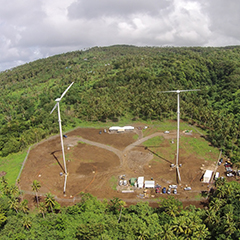Abu Dhabi, UAE – 29 August, 2014: The Samoan Prime Minister, the Honorable Tuilaepa Aiono Sailele Malielegaoi, today inaugurated the country’s first wind farm. Delivered by Masdar, Abu Dhabi’s renewable energy company, the 550 kWe project is the second completed under the United Arab Emirates’ (UAE) $50 million Pacific Partnership Fund, which is managed by Abu Dhabi Fund for Development (ADFD). The inauguration ceremony comes two days before the start of the United Nations’ Third Conference on Small Island Developing States (1), in Samoa’s capital.
His Excellency Dr. Sultan Ahmed Al Jaber, UAE Minister of State and Chairman of Masdar, explains: “This UAE supported project, and others like it underway across the Pacific, unlock significant economic and social benefits across the region. By providing local sources of renewable energy and reducing reliance on imported fuels, the UAE is helping countries like Samoa realize its development ambitions, while also delivering valuable clean energy infrastructure.
“Renewable energy has the potential to be a major contributor to the energy mix in developing countries, acting as a catalyst for greater socioeconomic opportunity. Today’s inauguration reinforces the UAE’s commitment to advancing and deploying renewable energy globally.”
Located on the Samoan island of Upolu – home to nearly 75 percent of the population – the wind farm will supply 1,500 MWh of power per year, delivering US$475,000 in annual fuel cost savings. The innovative ‘cyclone proof’ project will also reduce the island’s carbon footprint by more than 1,000 tons of carbon dioxide (CO2) each year.
The Prime Minister of Samoa, the Hon Tuilaepa Aiono Sailele Malielegaoi, adds: “The new wind farm delivered by Masdar and funded by the ADFD is a significant step forward in Samoa’s transition to a more sustainable energy future. This has been possible thanks to the support of Abu Dhabi and the United Arab Emirates, and their commitment to advancing sustainable development. Access to renewable energy is vital to our long-term economic development, even beyond the substantial gains realized by cutting our dependence on imported fuel.”
His Excellency Mohammed Saif Al Suwaidi, Director-General of the Abu Dhabi Fund for Development, said: “The Abu Dhabi Fund for Development is committed to working collaboratively with governments across the developing world, on projects that deliver tangible social and economic benefits.
“This innovative, bespoke project offers energy access to thousands of people, whilst demonstrating the validity of renewable energy as an economic enabler. We believe this project will unlock a significant opportunity for the Samoan government and its people.”
The UAE Pacific Partnership Fund supports the deployment of renewable energy across Pacific island states and represents one of the largest-ever investments in clean energy across the region. The grant is managed by the Abu Dhabi Fund for Development, and coordinated by the Ministry of Foreign Affairs, Directorate of Energy and Climate Change. Masdar partners with each nation’s government and leads the design and implementation process.
First announced during Abu Dhabi Sustainability Week in January 2014 (2), the Samoan wind farm is the second project to be completed under the fund. Masdar is also currently progressing solar PV projects in Fiji, Kiribati, Tuvalu, and Vanuatu. A 512 kWe solar PV installation in Tonga, achieving nearly 70 percent grid penetration, was the first project to be completed.
The projects address the very high cost of diesel imports in Pacific countries, as well as delivering reductions in CO2 emissions. Research from the International Renewable Energy Agency indicates that renewable energy is now the most cost competitive source of power in the Pacific (3), but deployment has been constrained by access to finance and expertise. The cumulative 2.8 MWe capacity of the six identified projects, will substitute 1.5 million litres of diesel fuel otherwise imported each year. The projects together will deliver annual savings of US$1.87m and avoid 4,450 tons of CO2.
The pioneering project in Samoa includes two 55 meters high turbines that can pivot at the base, and be lowered and locked in place in less than 1 hour. This collapsible design helps to avoid damage from the region’s numerous cyclones.
1. The event is the Third International Conference on Small Island Developing States and will be held from 1 to 4 September 2014 in Apia, (see link here <http://www.sids2014.org/> ). Its objective is to focus the world’s attention on a group of countries that remain a special case for sustainable development in view of their unique and particular vulnerabilities.
2. See the Masdar press release “5 Pacific Countries to Receive Grants from UAE’s $50m Renewable Energy Fund” (20 January, 2014), here <http://www.masdar.ae/en/media/detail/5-pacific-countries-to-receive-grants– from-uaes-50m-renewable-energy-fund> .
3. See link here.
About Masdar
Masdar, Abu Dhabi’s renewable energy company, is advancing the development, commercialization and deployment of clean energy technologies and solutions. The company serves as a link between today’s fossil fuel economy and the energy economy of the future. Wholly owned by the Mubadala Development Company PJSC, the strategic investment company of the Government of Abu Dhabi, Masdar is dedicated to the Emirate’s long-term vision for the future of energy and water.
For more information about Masdar, please visit: www.masdar.ae Stay connected: facebook.com/masdar.ae and twitter.com/masdar
About Abu Dhabi Fund for Development (ADFD)
ADFD is the UAE’s largest development financier. It was established in 1971 to provide concessional finance and other assistance for infrastructure projects in fellow developing countries. In addition to the $50 million UAE-Pacific Partnership Fund, ADFD also operates a $350 million soft loan facility for renewable energy projects in partnership with the International Renewable Energy Agency (IRENA).
About the Ministry of Foreign Affairs, Directorate of Energy and Climate Change (MOFA-DECC)
MOFA-DECC is the UAE’s international lead on energy, climate change, green growth, and related sustainability issues, as well as a partner in domestic policy formulation.



























